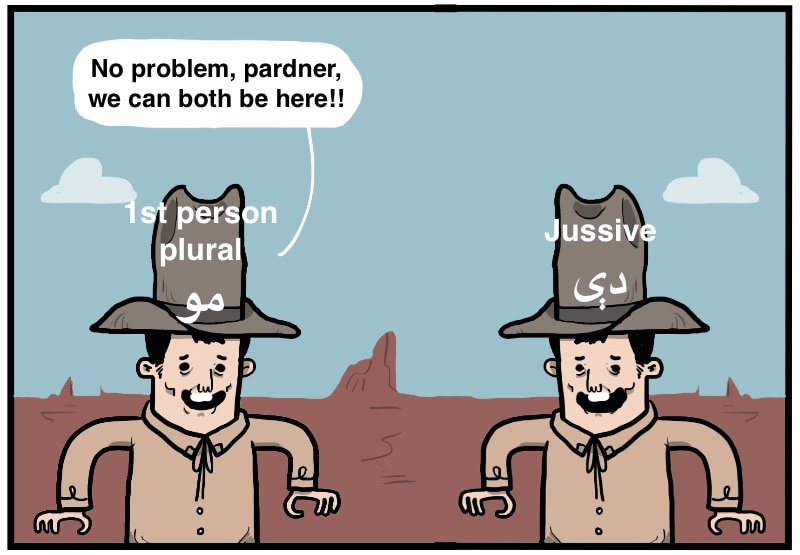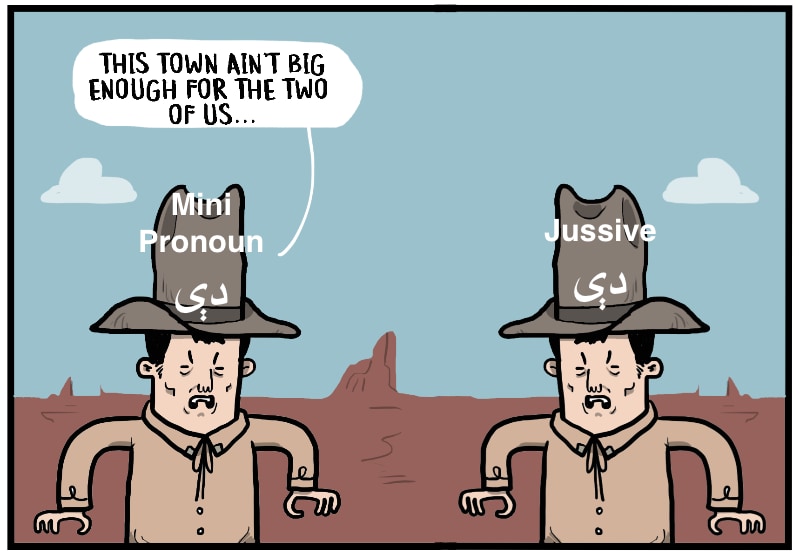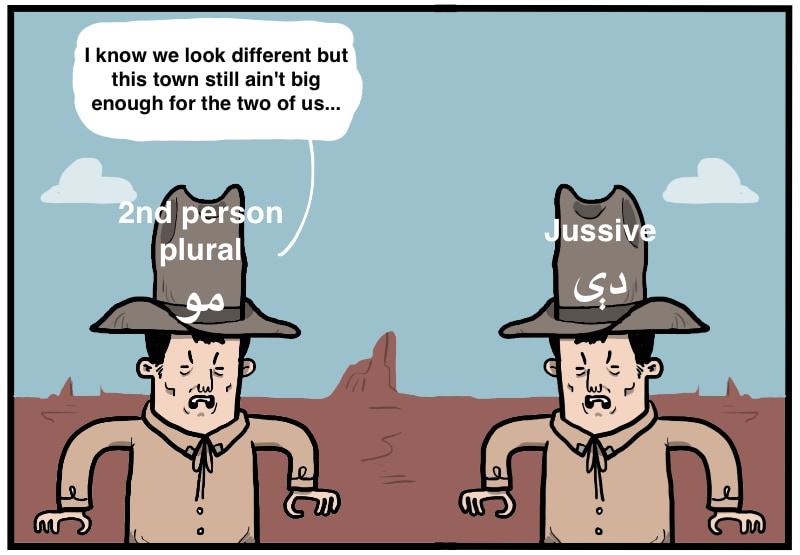Jussive and Blessings 🤲
In Pashto the jussive form is used to make orders or commands directed towards the 3rd person. This is also used for blessings and curses.
In English we would say something like "May he...", "Let them...", "May God..."
In Pashto you encounter phrases like this:
خدای دې خیر وکړي
khUdaay de khayr ookRee
May God do what's good/beneficial
خدای دې خوشحاله لره
khUdaay de khosháala lará
May God have you happy
There are a couple of questions that can confuse learners when they encounter these types of phrases:
- What does the دې - de particle refer to? Is it a mini-pronoun or a jussive marker?
- Why do some verbs end with ـي - ee, and some with ـه - a ?
In this section, we'll explain how this all works.
Spoiler quick answer:
- Basic form: Jussive phrases are made using the jussive دې - de particle with subjunctive or present verbs.
- Verbs end in ـي - ee (like the first example above)
- Exception: when there's a conflict with another 2nd pers mini pronoun like دې - de, we leave out the jussive دې - de marker and instead use the 2nd person imperative form.
- Verbs end in ـه - a (like the second example above)
🧪 Formula:
jussive دې - de +
Present or
Subjunctive
verb
The jussive دې - de is a particle that goes in the kids' section. And it is not to be confused with the 2nd person mini-pronoun دې - de!
هغه دې راشي
hagha de ráashee
Let him come / he should come
jussive دې + subjunctive verb
را دې شي
ráa-de-shee
Let him come / he should come
jussive دې + subjunctive verb (shortened)
خدای دې شفا ورکړي
khUdaay de shifaa wárkRee
May God give him health
jussive دې + subjunctive verb
خدای دې مونږ له مرضۍ نه ساتي
khUdaay de moonG la marizúy na saatée
May God keep us from sickness
jussive دې + present verb
Notice how you can use either:
- the perfective subjunctive for a one-time or instantaneous sense
- the imperfective present for an on-going or continuous sense
You can also use the subjunctive equative. For example:
ټولو ته مبارک وي
Tolo ta mUbaarak wee
Congratulations to everyone (may it be blessed to everyone)
jussive دې + subjunctive equative
Earlier we mentioned that this jussive particle دې - de is not to be confused with the 2nd person mini-pronoun دې - de.
So what happens when we need to use both in a sentence?? They both go in the kids' section, but we can't have two دې - de's in there. We can't ever say, "دې دې - de de."
First let's look at an example without this دې conflict:
خدای دې تا وبخښي
khUdaay de taa óobakhxee
May God forgive you
jussive دې + subjunctive
In this example تا - taa (you) is the servant so we can 🪄 shrink it into a mini-pronoun دې - de.
But now we've got the problem of the two دې - de (you) particles. We can't say this:
❌ خدای دې دې وبخښي ❌
❌ khUdaay de de óobakhxee ❌
May God forgive you
So here's the solution in Pashto... 🥁 Instead we get rid of the jussive دې - de and use a 2nd person singular imperative form.
خدای دې وبخښه
khUdaay de óobakhxa
May God forgive you
دې as a mini-pronoun + imperative verb
This is interesting, because normally we only use that imperative form when making commands to a a 2nd person singular (ie. "you"), but because we lost the ability to use the jussive دې - de, we are using to make a 3rd person jussive phrase.
Here are more examples of how we use this to resolve the دې دې - de de conflict:
خدای دې تا له مرضۍ نه ساتي
khUdaay de taa la marazúy na saatée
May God keep you from sickness
jussive دې + full تا pronoun + present verb
❌ خدای دې دې له مرضۍ نه ساتي ❌
❌ khUdaay de de la marazúy na saatée ❌
May God keep you from sickness
jussive دې + mini-pronoun دې (CONFLICT!)
خدای دې له مرضۍ نه ساته
khUdaa de la marazúy na saatá
May God keep you from sickness
mini-pronoun دې + imperfective imperative
الله دې تا په خیر ورسوي
allah de taa pu khayr óorasawee
May God deliver you safely.
jussive دې + full تا pronoun + subjunctive verb
❌ الله دې دې په خیر ورسوي ❌
❌ allah de de pu khayr óorasawee ❌
May God deliver you safely.
jussive دې + mini-pronoun دې (CONFLICT!)
الله دې په خیر ورسوه
allah de pu khayr óorasawa
May God deliver you safely.
mini-pronoun دې + perfective imperative
Remember that mini-pronouns can come from either shrunken servants or shrunken possessives. The same thing happens when resolving conflicts with دې - de when it comes from a shrunken possessive.
خدای دې ستا ارمان پوره کړي
khUdaay de staa armáan póora kRee
May God fulfill your desire
jussive دې + subjunctive
خدای دې ارمان پوره کړه
khUdaay de armáan póora kRa
May God fulfill your desire
mini-pronoun دې + imperfective imperative
ستا زوی دې لوی شي
staa zooy de looy shee
May your son grow big
jussive دې + subjunctive
زوی دې لوی شه
zooy de looy sha
May your son grow big
mini-pronoun دې + imperfective imperative
Things get a little more interesting when the jussive دې - de clashes with the mini-pronoun مو - mU. What happens depends on whether مو - mU is:
Just like you can't say دې دې - de de, you also can't have the jussive دې - de together with the second person plural مو - mU.
❌ خدای مو دې له مرضۍ نه ساتي ❌
❌ khUdaay mU de la marazúy na saatée ❌
May God keep you (pl.) from sickness
jussive دې + second pers. mini-pronoun مو
خدای مو له مرضۍ نه ساته
khUdaa mU la marazúy na saatá
May God keep you (pl.) from sickness
second pers. pl. mini-pronoun مو + imperfective imperative
❌ الله مو دې په خیر ورسوي ❌
❌ allah mU de pu khayr óorasawee ❌
May God deliver you safely.
jussive دې + second pers. mini-pronoun مو
الله مو په خیر ورسوه
allah mU pu khayr óorasawa
May God deliver you (pl.) safely.
second pers. pl. mini-pronoun مو + perfective imperative
خدای دې ستاسو ارمان پوره کړي
khUdaay de staaso armáan póora kRee
May God fulfill your (pl.) desire
jussive دې + subjunctive
خدای مو ارمان پوره کړه
khUdaay mU armáan póora kRa
May God fulfill your (pl.) desire
second pers. pl. mini-pronoun مو + perfective imperative
ستاسو زوی دې لوی شي
staaso zooy de looy shee
May your (pl.) son grow big
jussive دې + subjunctive
زوی مو لوی شه
zooy mU looy sha
May your son grow big
second pers. pl. mini-pronoun مو + perfective imperative

But if the is a 1st person plural pronoun, then it can co-exist with the jussive دې - de.
خدای دې مو له مرضۍ نه ساتي
khUdaa de mU la marazúy na saatée
May God keep us from sickness
first pers. pl. mini-pronoun مو + present
الله دې مو په خیر ورسوي
allah de mU pu khayr óorasawee
May God deliver use safely.
first pers. pl. mini-pronoun مو + subjunctive
خدای دې زمونږ ارمان پوره کړي
khUdaay de zmoonG armáan póora kRee
May God fulfill our desire
first pers. pl. mini-pronoun مو + subjunctive
خدای دې مو ارمان پوره کړي
khUdaay de mU armáan póora kRee
May God fulfill our desire
first pers. pl. mini-pronoun مو + subjunctive
زمونږ زوی دې لوی شي
zmoonG zooy de looy shee
May our son grow big
jussive دې + subjunctive
زوی دې مو لوی شي
zooy de mU looy shee
May our son grow big
first pers. pl. mini-pronoun مو + subjunctive
Notice for all these examples we never use the 2nd person imperative form, because we are still able to use the jussive دې - de.


